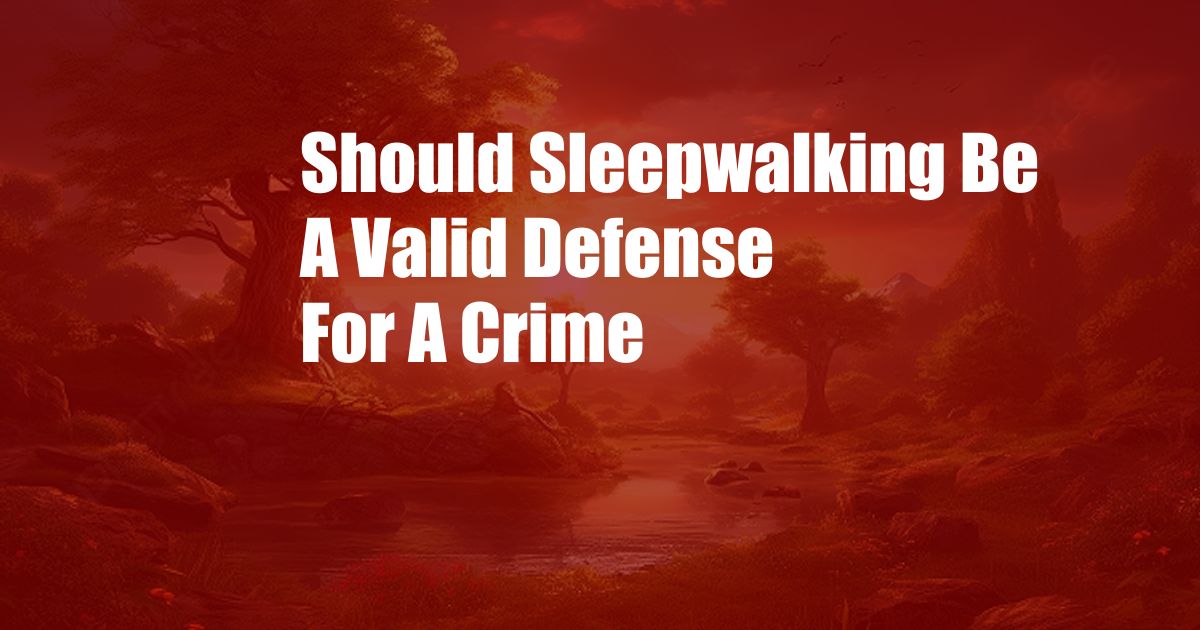
Should Sleepwalking Be a Valid Defense for a Crime?
Imagine waking up in a jail cell with no recollection of how you got there. You’re confused, disoriented, and horrified when you learn you’ve been accused of a serious crime. As you piece together the fragmented memories, a chilling realization dawns upon you: you were sleepwalking.
Sleepwalking, also known as somnambulism, is a condition where individuals perform complex actions while asleep. They may walk, talk, eat, or even drive without any conscious awareness. While this condition is often harmless, there have been rare cases where sleepwalkers have committed crimes.
Sleepwalking and the Law
The question of whether sleepwalking should be considered a valid defense for a crime is a complex legal and ethical issue. Historically, sleepwalking has been used as a defense with mixed success. In some cases, courts have recognized the unconscious nature of sleepwalking and acquitted individuals who committed crimes while in this state.
However, in other cases, courts have held individuals responsible for their actions during sleepwalking, arguing that they were not completely unconscious and could have prevented the crime by taking precautions. The legal standard varies from jurisdiction to jurisdiction, and the outcome of a case often depends on the specific circumstances and the severity of the crime.
The Science of Sleepwalking
To understand the legal implications of sleepwalking, it’s essential to delve into the scientific understanding of this condition. Sleepwalking is a parasomnia, a sleep disorder that causes abnormal behaviors during sleep. It typically occurs during non-rapid eye movement (NREM) sleep, the deepest stage of sleep.
Research suggests that sleepwalking may be caused by a combination of factors, including genetic predisposition, stress, sleep deprivation, and certain medications. During sleepwalking, the brain is partially aroused, causing individuals to move around and perform actions without conscious awareness. However, the level of consciousness and control varies among sleepwalkers.
Establishing a Sleepwalking Defense
If you are accused of a crime and believe you were sleepwalking, your attorney may present a sleepwalking defense. To establish this defense successfully, you need to prove that:
- You were in a state of sleepwalking at the time of the crime.
- You were not conscious of your actions and had no control over them.
- The crime you committed is not typically associated with violence or intent.
Medical evidence, such as sleep studies, can support your claim of sleepwalking. However, courts are cautious in accepting sleepwalking defenses, as they may be difficult to verify.
Expert Advice and Tips
If you are concerned about sleepwalking, there are several steps you can take to minimize the risk of potential harm:
- Establish a regular sleep schedule: Go to bed and wake up around the same time each day to regulate your sleep-wake cycle.
- Create a relaxing bedtime routine: Relaxing activities before sleep, such as taking a warm bath or reading a book, can promote better sleep quality.
- Avoid caffeine and alcohol before bed: These substances can interfere with sleep and increase the likelihood of sleepwalking.
FAQs on Sleepwalking
Can sleepwalking be predicted?
While sleepwalking cannot be predicted with certainty, certain risk factors may increase the likelihood, such as sleep deprivation, stress, and certain medications.
Is it dangerous to wake a sleepwalker?
It’s generally not dangerous to wake a sleepwalker, but it’s important to do so gently. Sudden or loud awakenings may startle them and cause confusion.
Is sleepwalking a mental illness?
No, sleepwalking is not a mental illness. It is a parasomnia, a sleep disorder that causes abnormal behaviors during sleep.
Conclusion
Sleepwalking is a complex condition that raises challenging legal and ethical questions. While it can be a mitigating factor in criminal cases, it is essential to remember that sleepwalking is not an automatic defense. Courts carefully consider the specific circumstances, the severity of the crime, and the extent of consciousness and control exhibited by the sleepwalker.
If you are interested in learning more about sleepwalking or have personal experiences you would like to share, please leave a comment below. Your insights and perspectives can contribute to our collective understanding of this fascinating phenomenon.